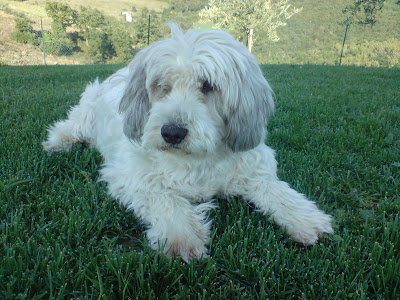

 The 'font of all knowledge' left at four thirty this morning for the two hour drive down to Rome to catch a flight back to London. Things must be looking up in the economy - all the British Airways flights were full apart from the anti-socially scheduled first slot of the day. We all got up at the same time to make use of the early morning cool and snatch a quick cup of coffee together. Not everyone rose from their slumbers gracefully - Wilf is not a morning canine and did his best 'if I keep my eyes closed they won't see me routine'. Having played dead he finally consented to shift to the front door but was unavailable for any form of communication thereafter . Not for nothing was he originally named Wilf as shorthand for wilful . It was left to Digby and myself to open the farm gate and watch the headlights of the car disappear into the distance. When I turned around to walk back to the house I found that Digby was sound asleep at my feet.Middle age catches up with all of us - two and four footed alike.
The 'font of all knowledge' left at four thirty this morning for the two hour drive down to Rome to catch a flight back to London. Things must be looking up in the economy - all the British Airways flights were full apart from the anti-socially scheduled first slot of the day. We all got up at the same time to make use of the early morning cool and snatch a quick cup of coffee together. Not everyone rose from their slumbers gracefully - Wilf is not a morning canine and did his best 'if I keep my eyes closed they won't see me routine'. Having played dead he finally consented to shift to the front door but was unavailable for any form of communication thereafter . Not for nothing was he originally named Wilf as shorthand for wilful . It was left to Digby and myself to open the farm gate and watch the headlights of the car disappear into the distance. When I turned around to walk back to the house I found that Digby was sound asleep at my feet.Middle age catches up with all of us - two and four footed alike.An interesting article in todays Corriere della Sera pointing out that the side effects of Tamiflu - the drug issued as a means of preventing swine flu - are worse than the flu itself. Nausea , sleep loss and high irritability are the most common symptoms. That's ok then.

















































